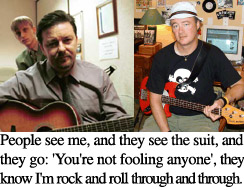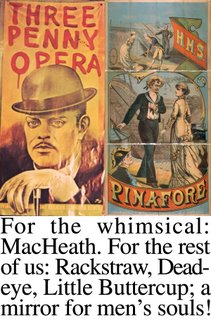Blond Matter: Immaturity as Virtue
The parents of an 11-year-old Mississauga student are charging that school officials violated their son's right to freedom of speech after the boy was prohibited from reading aloud a dissertation about classroom boredom.
Frank and Donna Trimboli say they were upset when their youngest son, Gianmarco, returned home from St. Sebastian Catholic School about two weeks ago with news that his speech was "unacceptable and derogatory." The teacher and principal asked him to produce another for his Grade 6 class, Mr. Trimboli said. [...]
There was a time--the prematurely old coot in me wants to point out--when situations such as this were considered no-brainers. (Prematurely old coot, I say, because it couldn't have been more than 20 years ago that this was the case, and is much more like 10.) A time when, apart from anything else, most parents could be relied upon to recognize the absurdity of braying to the newspapers about a boy's "right to freedom of speech" when, at the age of 11, he hasn't even the right to drive or to vote. (Or, dare I mention it, to die for his country.)
Alas, those days are gone. And hear the idiot hosannahs that hail their passing:
Three cheers for 11-year-old Gianmarco Trimboli and his parents. It is, however, disconcerting to see how little our school system has changed in the last 40 years. I'll never forget the day in Grade 5 when our teacher assigned a letter of the alphabet to each student and randomly called on several of us to give a three-minute speech about a topic beginning with their letter. When asked, I began a speech I called "N is for noise," about how the noise kids made in class was a reflection of boredom, rather than an intrinsic desire to misbehave [It's unclear whether these were her exact, ten-year-old's words --ed.]. I was interrupted in the middle of my speech by the irate teacher who sent me to the principal's office, where I was suspended from school until I could be assessed by a psychologist and begin "appropriate treatment."This from one Dr. Ellen Warner (Associate Professor of Medicine, University of Toronto); who--I can't help thinking--mayn't have been in need of psychological attention at the age of 10, but could very well use a bit now, what with this insane and vociferous obsession of hers with an elementary school teacher she had 40 years ago ... Indeed, you get the impression from her letter that, far from giving a sweet goddamn about "smiley and outspoken" Gianmarco Trimboli--whom she only mentions the once--she's just trying to get that one blot finally off her elementary school copybook. The thing that's been keeping her from tenure all these years.
A child psychologist I was referred to informed the principal that there was nothing wrong with me but that the teacher herself might benefit from some counselling.
Today, I still pride myself on thinking outside the box and on challenging authority when appropriate. Questioning the status quo has made me a successful researcher, and my willingness to advocate on behalf of my patients has made me a better physician. And when my medical students look bored, I know I have to try that much harder.
But what is most notable about Dr. Warner's letter is her assertion that students who "look bored" inspire her "to try that much harder." She doesn't, you'll notice, bother to tell us whether or not she actually succeeds in her efforts ... And I'd bet you dollars to donuts that even if she is one of that extremely rare breed of teacher that is truly and consistently effective as such, you'd be hard pressed to find a single student of hers who could say that she wasn't, at least on occasion, a little bit boring.
And there's the rub.
No matter how good a teacher is--no matter how mature the student--boredom, at some point or many, with any and all subject matters, is inevitable. In-ev-it-a-ble! Encouraging a student to spend his class time moaning about being bored is, then, about as conducive to his education as encouraging him to complain that he always feels sleepy after having been up for seventeen hours.
But the real problem with all of this is that even if you could find enough intelligent, charming, talented, and boundlessly energetic people to man every school in the nation--thereby keeping the level of boredom down to a bare minimum--I defy you to get even a tenth of them to take so much as a step across the classroom threshold knowing that they will be held to account for Charter violations, and even made the subjects of nationwide media scrutiny, if they dare to suggest that anything a child of 11 says is inappropriate.
... Up until very recently I would have said that it was unlikely that someone like Dr. Walker could ever come to grasp this, given that the students in her classes have actually chosen to be there and are, obviously, much more mature than your average sixth grader. But in light of certain trends observed in the attitude of your average university student these days, I begin to wonder.
Had any anthrax threats from any of your lower achievers yet, Dr. Walker?












